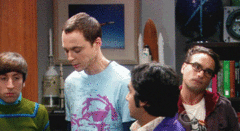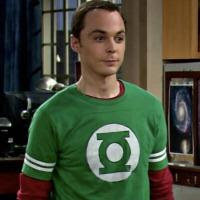Quite by accident, I stumbled across the show The Big Bang Theory. During an episode of CBS’s How I Met Your Mother (a favourite of mine), an advertisement for a comedy about scientists came on. I immediately dismissed it – I do not consider myself particularly scientifically oriented so I failed to see how they could frame a whole sitcom around it. A few nights later, while doing the dishes with the television blaring in the background, I was introduced to Sheldon Cooper. I remember the line (delivered in rapid pace without any real emotion) that caught my attention: “If you use my toothbrush I will jump out that window. Please don’t come to my funeral. Have a good night.” I laughed - it sounded like something a scientist (therefore, a ‘nerd’ lacking social skills) would say. I made a point to catch a full episode the next time around and since then, it has become my go to show for guaranteed laughs. I am not alone either. The Big Bang Theory, a show about four Caltech researchers’ adventures (usually involving their beautiful blonde neighbour), is one of CBS’s top rated shows, pulling in an average of 13.13 million viewers per episode in its latest season (Gorman, 2011).
I would venture that it is safe to say that the show’s breakout character is Sheldon Cooper, a theoretical physicist whose face now adorns merchandise and whose catchphrase “Bazinga” is creeping its way into everyday language. Those who watch the show are seemingly captivated with Sheldon’s odd behaviour and total lack of social skills. A close analysis of these traits has many assuming that Sheldon has Asperger’s Syndrome, and that perhaps, he is one of the few characters on television to be portrayed as such. For the past few years, this topic has become highly debated (examples of these debates can be found here, here and here). However, it is interesting to note that the co-creator of the show, Bill Prady, has said that Sheldon does not have Asperger’s (Sepinwall, 2009). As well, Jim Parsons, who portrays Sheldon, has said in an interview that he questioned the writers and received a similar answer (Murray, 2009). Officially, in the minds of those who run the show, he is without a label - except of course for the ‘nerd’ title. However, in the minds of many of the viewers, without a doubt, Sheldon Cooper has Asperger’s Syndrome.
I count myself amongst those many viewers. The more I watch The Big Bang Theory the more I become convinced. He exhibits many of the behaviours one associates with the syndrome. I could give you an episode by episode breakdown of examples but in the interest of saving time, I will highlight some of the more obvious behaviours.
From the very first episode, one realizes that Sheldon is a creature of habit. He has set routines for many of his daily activities. For instance, he has a small menu of things he will eat. He has a schedule of leisure activities for every day of the week, usually involving video games, using the computer or watching sci-fi movie marathons. He even has a bathroom routine. He has a chosen spot on the couch and it is evident that it has been that way for a while for he has left a distinctive groove in the cushion (and immediately notices something is wrong when the cushion is flipped as evidenced in this clip). Any disruption to these routines is met at the very least by protest. In some cases, Sheldon can become very upset and do whatever he can to re-establish the routine.
Sheldon is also very concerned with cleanliness and personal hygiene. He does not like clutter, and wants things in very specific places. Upon seeing Penny’s messy apartment in the second episode of the first season (entitled “The Big Bran Hypothesis) he becomes fixated on the idea of straightening it, even going so far as to use a spare key to do so while she slept. He also maintains a high standard of personal hygiene and will refuse to take part in certain activities if he believes it will compromise his standards. He even goes as far as to ostracize his friends at the first sign of illness (as evidenced by his “explain your sneeze” interrogation of Raj that ended with Raj being sent away).
Taken on their own, these examples may point to the conclusion that Sheldon has Obsessive Compulsive Disorder. However, what truly makes me believe that Sheldon has Asperger’s Syndrome is when you combine these examples with Sheldon’s overall lack of understanding of social situations and his struggle to show and read emotions.
Many of the laughs viewers gain from Sheldon usually involve his performance in a social situation. He clearly does not understand the conventions of conversation. He starts and ends conversations abruptly. He interrupts but does not like to be interrupted (and will in fact sometimes display a facial tic until he can finish his thoughts). He also is honest, often not realizing the consequences of what he has said. Within minutes of meeting Penny for the first time he tells her that he and Leonard “tried masturbating for money” (in reference to visiting a sperm bank earlier that day). He often says things considered hurtful and has to be informed that he has done so for him to realize this. He also broaches topics that may be considered taboo by others. An excellent example can be seen when he strikes up a conversation with Penny regarding her use of tampons. She does not want to continue the conversation but Sheldon pushes forward, not realizing that it is not common to engage in such a conversation with a neighbour. It is only when she slams the door in his face does he drop the conversation.
His inability to read Penny’s tone of voice and facial expressions in this scene brings me to my second point in regards to Sheldon’s struggles socially – it is clear that he has a hard time understanding and expressing emotion. When others express frustration with him most often he is unaware and continues with the behaviour that has frustrated them in the first place. The characters’ emotions, which are obvious to the audience through facial expression and tone of voice, seemingly go right over his head. A classic example (and perhaps one of my favourite scenes on the show) occurs the morning after he has cleaned Penny’s apartment while she slept. She is obviously very angry at the invasion of her privacy and employs sarcasm when speaking with Sheldon. He is oblivious to this tactic and has to be clued in by Leonard who stands behind Penny holding up a sign that reads ‘sarcasm’. It is only then that he realizes the true extent of Penny’s anger over the situation.
Similarly, he has trouble expressing his emotions. Sheldon speaks in a very monotone voice and his facial expressions appear very neutral. In the episode “The Griffin Equivalency”, Sheldon is prompted to smile to show Raj that he supports him. He struggles with coming up with a smile and when he displays it to Raj it has the opposite of the intended effect. In another episode, he awkwardly hugs Penny to thank her for a Christmas gift - a process that is drawn out and played for laughs. It is obviously that hugging does not come natural to him. Realizing this, Penny is touched by the gesture.
Given his behaviour and the amount of amusement viewers gain from it, what is Sheldon’s position on the show? On many shows, he might be the odd one out sort to speak (imagine Sheldon on a show like Friends or any other sitcom surrounding the ‘average’ person). However, on The Big Bang Theory Sheldon is not the only one who is awkward socially. The three others scientists, Leonard, Howard and Raj, all find themselves struggling when they try to converse with people outside of their tight circle. Leonard seems to be the most able to handle himself, but still has a hard time expressing his attraction for Penny. Howard, who still lives at home with his mother, is very forward in his flirtation with women, causing many to avoid him after hearing one of his pickup lines (“Well, if you like space stuff, I design components for the International Space Station. Which is in space. Where, I'm sure you know, no one can hear you scream” is a favourite of mine). As Raj is an immigrant from India, many of his social blunders comes from not knowing the American culture. However, he also is selectively mute, finding it difficult to speak to women until he has grown comfortable around them. Within this circle of friends, Sheldon’s behaviours do stand out – but not overly. While Leonard, Howard and Raj occasionally express frustration with Sheldon’s behaviour, they generally accept him and help him maintain his routines. In fact, the character who does not seem to fit in at all is the girl next door, Penny, who represents the ‘average’ person. There are many examples of Penny being excluded and she is often the brunt of many jokes and jabs regarding her intelligence and lack of knowledge in relation to science fiction literature and visual media. The fact that Penny is often the odd one out is one of the reasons The Big Bang Theory is the opposite of traditional sitcom.
I often ponder why those in charge of The Big Bang Theory are so adamant in their statements that Sheldon does not have Asperger`s. I wonder (as have others) if they are afraid of backlash by affixing the Asperger`s label to him. Perhaps they believe that viewers would not find the jokes as funny if they believed they were laughing at someone who has a neurological reason for acting the way he does. In the same interview in which Purdy reveals that Sheldon does not have Asperger`s he indicates they did not want to feel pinned in to having him act a certain way (Sepinwall, 2009). I guess they are also afraid that some might begin to analyze the show and point out behaviour that might not fit the standard of someone with Asperger`s (in truth there have been instances where I have felt that Sheldon`s behaviour contradicts itself, but these are few and far between).
Whether or not they have intended him to, Sheldon has become a symbol for the Asperger`s community. It seems many relate to and embrace him (an example can be found here). He is on one of the most successful shows on television now and Jim Parsons has received critical acclaim and awards for his work. Loved by many, Sheldon is definitely on his way to becoming a pop culture icon. In my eyes, he is also a refreshing portrayal of someone with a disability. Sure, many jokes are played at his expense, but in the context of the show, they are never distasteful. Sheldon Cooper seems proud of who he is and what he has accomplished – and I see no reason why he should not be!



No comments:
Post a Comment